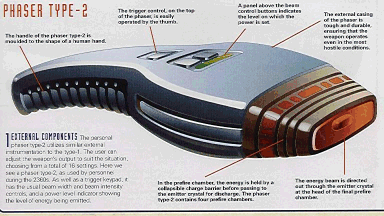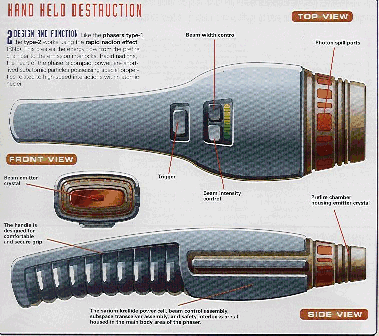




| |

Personal
Phasers:Operation
The
personal Phaser is the smallest of the standard issue weapons used by
most Starfleet personnel. It has a variety of power settings and
frequently proves invaluable for personal defense in hostile situations, as well
as for several other uses.
The
actual term, phaser, is an acronym for PHASed Energy Rectification.
Personal phasers were first developed by Starfleet in the 23rd century as
a defensive beam weapon for use by personnel heading into uncertain situations
on alien worlds.
There are actually three classes of personal phaser. The Type-1 phaser is
a hand-sized unit, easily concealed, and hence ideal for use on diplomatic or
similarly sensitive missions, where it would be unwise to appear heavily armed. Type-2
phasers are larger, more powerful weapons issued to personnel heading into
known hostile environments. The Type-3 phaser rifle is only issued in
special situations.
All phasers are capable of firing beams of varying power. The settings include
'stun', to render an organic target unconscious; 'heat', for warming objects
such as rocks for use as heat or light sources; and 'disruption', which destroys
objects and almost any known life form.

Type-1
Phaser
| 1 |
![[Type-1 Phaser]](images/phaser1.gif) External components Most personal phasers utilize the same
external instrumentation, allowing the user to adjust the weapon's
output to suit the situation. Here we see a type-1 phaser, as used by
personnel aboard the USS Enterprise NCC 1701-d. As well as a
trigger keypad it has beam width and beam intensity controls. A power
level indicator gives an indication of the energy being emitted.
External components Most personal phasers utilize the same
external instrumentation, allowing the user to adjust the weapon's
output to suit the situation. Here we see a type-1 phaser, as used by
personnel aboard the USS Enterprise NCC 1701-d. As well as a
trigger keypad it has beam width and beam intensity controls. A power
level indicator gives an indication of the energy being emitted. |
| 2 |
![[Type-2 Phaser]](images/phaser2.gif) Internal Components Phasers work using the Rapid nadion effect
(RNE), creating the energy flow from the prefire chamber to the emission
aperture. They all contain beam control assembly and safety interlocks,
a subspace transeiver array (STA) and a sarium krellide
energy cell which can be recharged. Rapid Nadions, the heart of the
phaser's compact power, are short-lived sub-atomic particles possessing
special properties related to high-speed interactions within atomic
nuclei.
Internal Components Phasers work using the Rapid nadion effect
(RNE), creating the energy flow from the prefire chamber to the emission
aperture. They all contain beam control assembly and safety interlocks,
a subspace transeiver array (STA) and a sarium krellide
energy cell which can be recharged. Rapid Nadions, the heart of the
phaser's compact power, are short-lived sub-atomic particles possessing
special properties related to high-speed interactions within atomic
nuclei.
One such property involves the liberation and transferal of strong
nuclear forces within fushigi-no-umi - a class of superconducting
crystals. In short, the RNE allows the conversion of stored energy into
tightly-controlled beams for a variety of applications. |
| 3 |
![[Type-1 Phaser]](images/phaser3.gif) Safety interlock Instructions from the beam control assembly are
sent through to the safety interlock, which can configure a trigger
'safety' or personalize a phaser for limited use by one individual only.
Typically, phasers are set at level one while in storage aboard ship,
but can be deactivated by the onboard computer, even upon vocal command,
thanks to the subspace transceiver array (STA). If necessary, the
disabling command can be overridden by a series of keypad inputs.
Safety interlock Instructions from the beam control assembly are
sent through to the safety interlock, which can configure a trigger
'safety' or personalize a phaser for limited use by one individual only.
Typically, phasers are set at level one while in storage aboard ship,
but can be deactivated by the onboard computer, even upon vocal command,
thanks to the subspace transceiver array (STA). If necessary, the
disabling command can be overridden by a series of keypad inputs. |
| 4 |
![[Type-1 Phaser]](images/phaser4.gif) Energy The energy from the power cell, as controlled by these
modules and routed through shielded conduits, arrives at the spherical
prefire chamber - a LiCu 521 unit some 1.5cm in diameter and reinforced
with gulium arkenide. This sits just behind the emitter crystal
which is composed of the same material. A collapsible charge barrier
temporarily holds back the beam before emission.
Energy The energy from the power cell, as controlled by these
modules and routed through shielded conduits, arrives at the spherical
prefire chamber - a LiCu 521 unit some 1.5cm in diameter and reinforced
with gulium arkenide. This sits just behind the emitter crystal
which is composed of the same material. A collapsible charge barrier
temporarily holds back the beam before emission. |
| 5 |
Firing When the trigger is pressed, the charge field barrier
breaks down in 0.02 picoseconds, creating a pulse which the segmented
emitter's RNE converts into the tuned phaser discharge. The more energy
'pumped' through this process, the higher the percentage of nuclear
disruption force gained.
![[Type-1 Phaser]](images/phaser5.gif) |

| Settings
for the Personal Phaser type-1 |
|

|
| 1 Light Stun |
3 Heavy Stun |
5 Thermal Effects |
7 Disruption effects |
| Knocks out base-type
humanoids for upto five minutes |
Puts base-type humanoids to
sleep for around one hour |
Causes severe burn effects to
humanoid tissue |
Kills humanoids as disruption
effects become widespread |
| 2 Medium Stun |
4 Thermal Effects |
6 Disruption Effects |
8 Disruption effects |
| Knocks out base-type
humanoids for upto 15 minutes |
Causes neural damage and skin
burns to base-type humanoids |
Causes matter to disassociate
and deeply penetrates organic tissue |
Cascading disruption forces
vaporize humanoid organisms |
|

Hand
Phasers: 24th Century
Although
the Federation is a peaceful organization, personnel carry weapons in
order to defend themselves from the numerous hostile life forms they are likely
to encounter. The versatile phaser type -2 can be used to lightly stun a
human or to blast through rock.
The
phaser type-2 is an intermediate size hand-held weapon, it lies between
the smaller hand phaser, or phaser type-1, and the much larger phaser
rifle, or phaser type-3.
The phaser type-2 has a significantly increased power and range in comparison to
the phaser type-1, with 16 settings available - twice as many options as are
available with the type-1.
By 2366, pistol phasers are a single unit almost like a 20th century flashlight.
The firing button is on the top and is operated by the thumb rather than at
front of the pistol grip and operated by the forefinger, as was the case with
earlier models. Close to the trigger are controls which can be used to vary beam
width and intensity.
The model of phaser type-2 in use by 2366 has 16 settings, ranging from light
stun to disintegrate. The lowest, or stun setting, is designed to cause
temporary unconsciousness in humans for up to five (5) minutes, while setting 16
causes major geological displacement and can even damage objects within shields.
Intermediate settings can be used to drill holes, cut an object into pieces, or
merely heat an object such as a rock to provide warmth.
Charging
the phaser
As with the phaser type-1, energy is stored within a sarium krellide power cell
which can be replenished when empty (Read
Nickel Cadmium). Personnel on board starships can charge their phasers
through the standard power taps of the electro-plasma system. Away from the
ship, portable bulk sarium krellide units are used. The power cell of the phaser
type-2 measures just 10.2 x 3.0 cm and holds 4.5 x 107 MJ of energy.
Explosive
energy
Due to the potentially dangerous nature of the phasers, there are a number of
safety interlocks built into the system. On board ship, a subspace transceiver
array built into the phaser maintains contact with the ship's computers to
restrain power levels to below those which would damage the ship - generally
limiting them to heavy stun. In addition, the phaser also contains safety
interlock, a code processor which, amongst other functions, can personalize
phasers for use by certain personnel only. Key-press combinations of beam width
and intensity controls are used to configure the phaser's safety condition. Even
when not in use, a phaser constantly trickles energy. Normally, the weapon is
prevented from overloading by the safety interlocks, but this makes it possible,
in extreme situations, to set a phaser on overload, turning it into a makeshift
bomb. If the phaser is not allowed to give off energy at a defined rate, it will
sound a warming noise for a few seconds, and then explode, causing the death and
destruction of everything within a radius of several meters.
This particular model is used until 2365, after which a slimmer, sleeker version
comes into general use. 

| Settings
for the Personal phaser type-2 |
| 1 Light Stun |
5 Thermal Effects |
9 Disruption Effects |
13 Disruption/explosive Effects |
| Knocks out base-type humanoids for
upto five minutes |
Causes severe burn effects to
humanoid tissue |
Damage to heavy alloy and ceramic
materials over 100cm thick |
Light vibrations to shielded matter.
Medium geological displacement |
| 2 Medium Stun |
6 Disruption Effects |
10 Disruption Effects |
14 Disruption/explosive Effects |
| Knocks out base-type humanoids for
upto 15 minutes |
Causes matter to disassociate and
deeply penetrates organic tissue |
Heavy alloy and ceramic materials
over 100cm tick vaporize |
Medium vibrations to shielded matter.
Heavy geological displacement |
| 3 Heavy Stun |
7 Disruption Effects |
11 Disruption/Explosive Effects |
15 Disruption/explosive Effects |
| Puts base-type humanoids to sleep for
around one hour |
Kills humanoids as disruption effects
become widespread |
Ultra dense alloy materials vaporize.
Light geologial displacement |
Major vibrations to shielded matter.
Heavy geological displacement |
| 4 Thermal Effects |
8 Disruption Effects |
12 Disruption/Explosive Effects |
16 Disruption/explosive Effects |
| Causes neural damage and skin burns
to base-type humanoids |
Cascading disruption forces vaporize
humanoid organisms |
Ultra dense alloy materials vaporize.
Medium geological displacement. |
Shielded matter exhibts fractures.
Heavy geological displacement |

  
|